Classics morals can be told through more relevant books
April 28, 2022
While classics may have been an excellent example in the past, they are not a good replica of the present. Today, the modern-day human is not venturing out west on horse and buggy or is going through the great depression. The modern-day human is discovering the individuality of their religion, gender, sexuality, etc. These things are not taught in the classics.
The definition of a classic is “judged over a period of time to be of the highest quality and outstanding of its kind.” For these books to be judged with good reviews in the early 1900s and to still be redeemed as undated now is preposterous, because their are so many other books that create better examples in modern times.
For example, “Romeo and Juliet” by William Shakespeare is a story that students enrolled in freshman English I at Metea. While the moral of the book stays relevant to this generation, there are so many better stories that can tell this, such as “Five Feet Apart” by Mikki Daughtry. This story is about two teenagers with cystic fibrosis who fall in love but can not be within five feet of one another. They have a barrier to their love just like Romeo and Juliet. Their love relates to people of this generation therefore helping tell a better story to their audience.
“Five Feet Apart” compared to “Romeo and Juliet” is one of many examples of stories that can be modernized to entertain the people reading the classics either for a class project, a book club, or just for fun. Classics are not relevant to the modern-day world due to the fact that they can be replaced with other books that relate the same moral message while relating to this generation.








